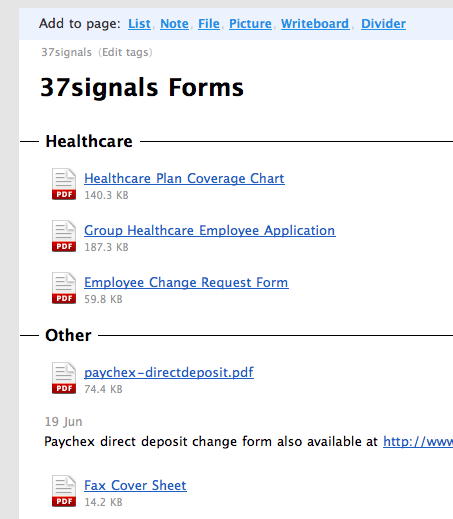UPDATE: Rework is now available! Check out a few sample chapters, original artwork, and reviews on the Rework book site.
Today we can officially unveil the cover for our next book, Rework. It’ll be in your favorite bookstore on March 9, 2010.
Update: You can now pre-order from the retailers shown below by clicking on the appropriate button…





We’re thrilled with the design. Simple, bold, and memorable. Hats off to the designers at Crown (our publisher) who indulged us, put up with us, and, in the end, crafted a beautiful design.
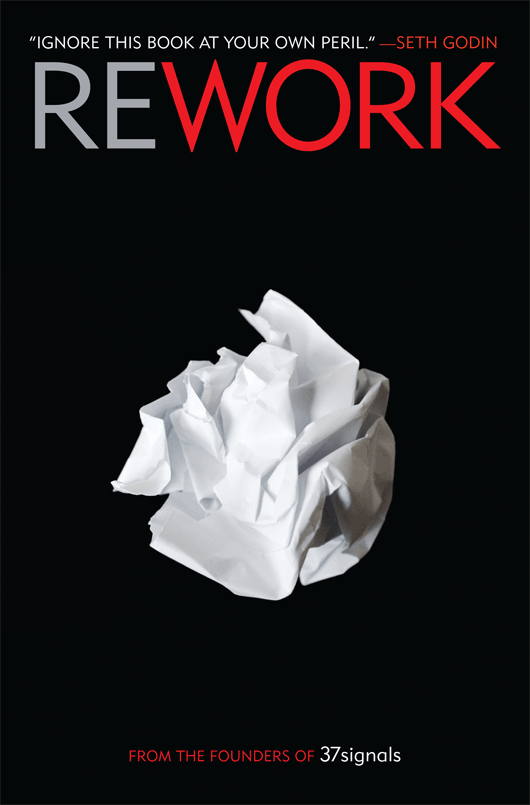
The front.
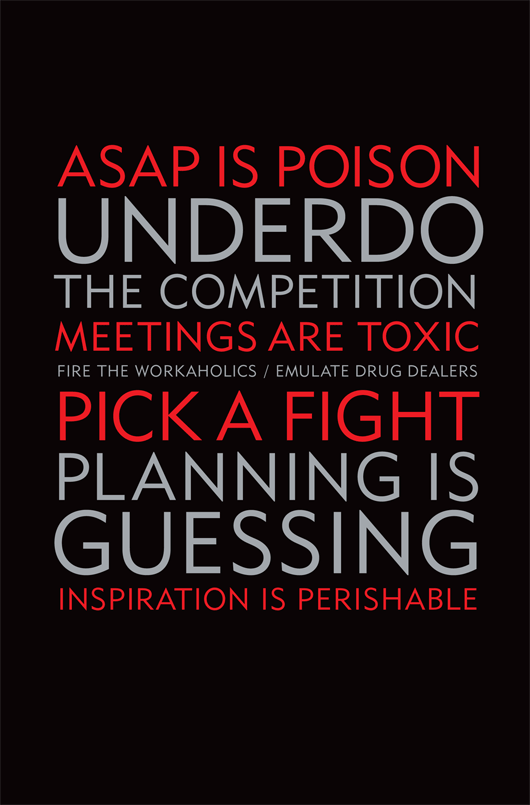
The back.
We can’t wait to share this book with you. Everything we know about business is in Rework. Subscribe to our mailing list and follow us on Twitter for news, updates, and the latest announcements related to 37signals and Rework.
Yesterday we launched the redesign of the signup form used by Basecamp, Highrise, Backpack, and Campfire. This is one of the last phases of the marketing site redesign project we started earlier this year.
The new signup form design pulls from the look, feel, and language of the new marketing sites. The previous form, which pulled more from the previous generation’s site design, was dated and too long.
We’ve been watching a lot of Clicktale recordings of form usage and we noticed that just about everyone scrolls down to the bottom of the form, then back up, before they start filling out the form. So we wanted the redesigned form to be markedly shorter than the one it was replacing.
By moving instructions, shifting the header to the sidebar, widening the form field content area, rewording long blocks of text, and hiding elements that were infrequently used, we were able to save a good bit of vertical space. We also redesigned the error states and moved most of the error checking to the client side to prevent unnecessary reloads.
The images below provide a rough estimation of compared height. They aren’t resized to perfect scale, but they’re close enough to demonstrate the space savings. The number of fields, and the order of the fields, are the same.
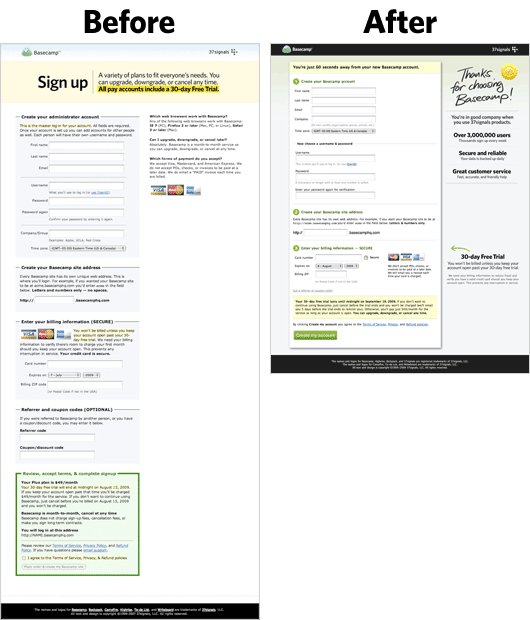
Continued…
 A few weeks ago I posted a teaser of something we’ve been working on. I said it was a little something, but it’s actually a big something. We’ve been working on it for over a year. It will lay the foundation for a lot of great stuff in the future.
A few weeks ago I posted a teaser of something we’ve been working on. I said it was a little something, but it’s actually a big something. We’ve been working on it for over a year. It will lay the foundation for a lot of great stuff in the future.
Over 150 people guessed what it was, and to our surprise, the seventh guess was spot on:
Looks like a identity card or license to me. I’m going to guess unification of user accounts across all apps into a single “37signals id” for each user. If I’m right I will be very happy. Been waiting for years.
It’s been hard to keep this bottled up. We’re really pumped to introduce this major improvement across our paid product line. We’re still working on it, but we wanted to begin to share what we’ve been working on with you.
Continued…
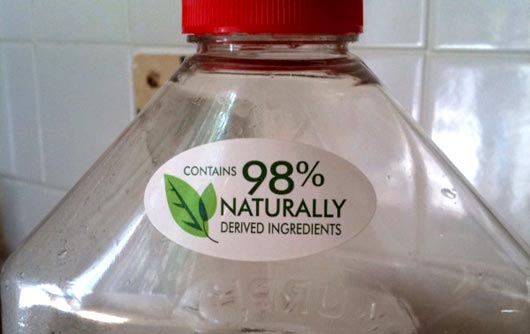
As seen on a bottle of Murphy Oil Soap. 98% naturally derived ingredients. I don’t even know how to parse that.
Does 98% natural actually matter? It’s still 2% artificial. So if you’re looking for all-natural, does almost-all-natural matter? I suspect almost-all-natural probably sells product, but it feels disingenuous to me.
Further, the “derived” disclaimer sounds like a stretch. Is 98% natural and 98% derived from natural ingredients the same thing? Aren’t most artificial things ultimately derived from naturally occurring ingredients? The distinction hides something they don’t want you to know.
This Murphy bottle sticker is just one example of what I like to call “little green lies” — product packaging and advertising claims that try hard to spin natural stats on unnatural products in their favor.
To celebrate FormSpring’s integration with Highrise, the folks at FormSpring sent us a cake. We will now integrate with chocolate.
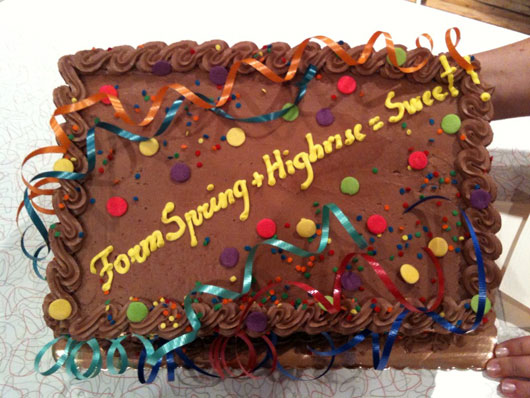
Very thoughtful of you guys. Thanks!
Busting your ass planning something important? Feel like you can’t proceed until you have a bulletproof plan in place? Replace “plan” with “guess” and take it easy. That’s all plans really are anyway: guesses.
So next time you’re working on a business plan, call it a business guess. And that financial plan? It’s a financial guess. Strategic planning? Call it with it really is: a strategic guess. 5 year plan? You mean 5 year guess.
There’s nothing wrong with guessing, dreaming, or predicting, but it’s not planning. Planning’s too definite a term for most things. We often use planning when we really mean guessing. And what we call it has a lot to do with how we think about it, do about it, and devote to it. I think companies often over think, over do, and over devote to planning.
So next time call a plan a guess and just get to work.
An interesting thing happens when your customer base reaches a certain size: You cease having edge cases. I think we’ve probably been at that point for a good year now – maybe longer – but we’ve really felt it recently.
Mistakes, bugs, incompatibilities, and related issues that used to affect a handful now affect hundreds. 1% is a real number now.
This requires some organizational change. More caution, more testing, more contingency planning, more disaster planning. These are good things in one direction and frustrating things in another. Regardless, they’re real and here to stay.
It’s a healthy reminder that companies can change, policies can change, techniques can change, perspectives can change. This change can come quick or take many years, but it’s usually already happened before you really notice it. It’s your job to catch up with it. What once worked before may not work again just as what didn’t work before may work now.
Personally, I’m finding it invigorating. It’s a new challenge for us as we continue to grow—people, revenues, exposure, influence, and responsibility.
As we approach our 10th anniversary, I’m reminded of what we’ve always known to be true: simpler is better, clarity is king, complexity is often man-made, and doing the right thing is the right way to do things.




 A few weeks ago
A few weeks ago 